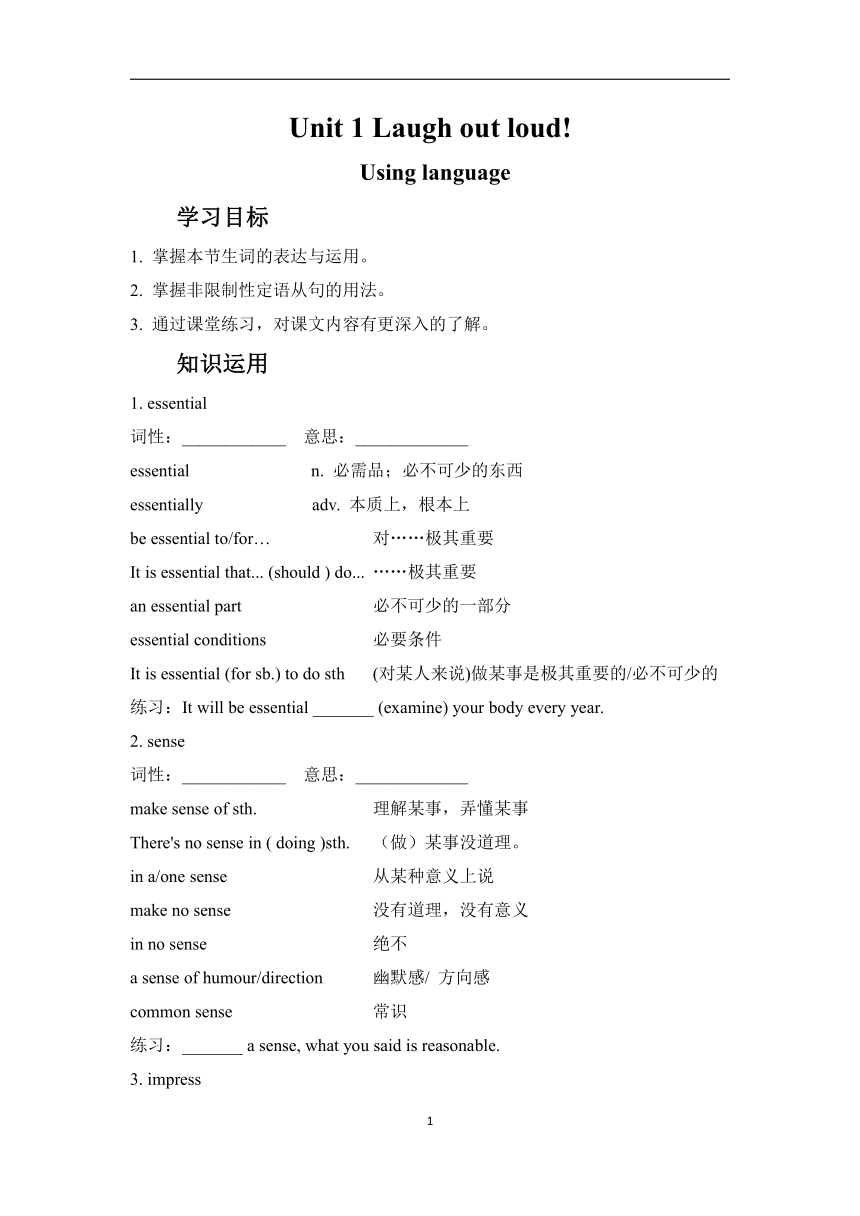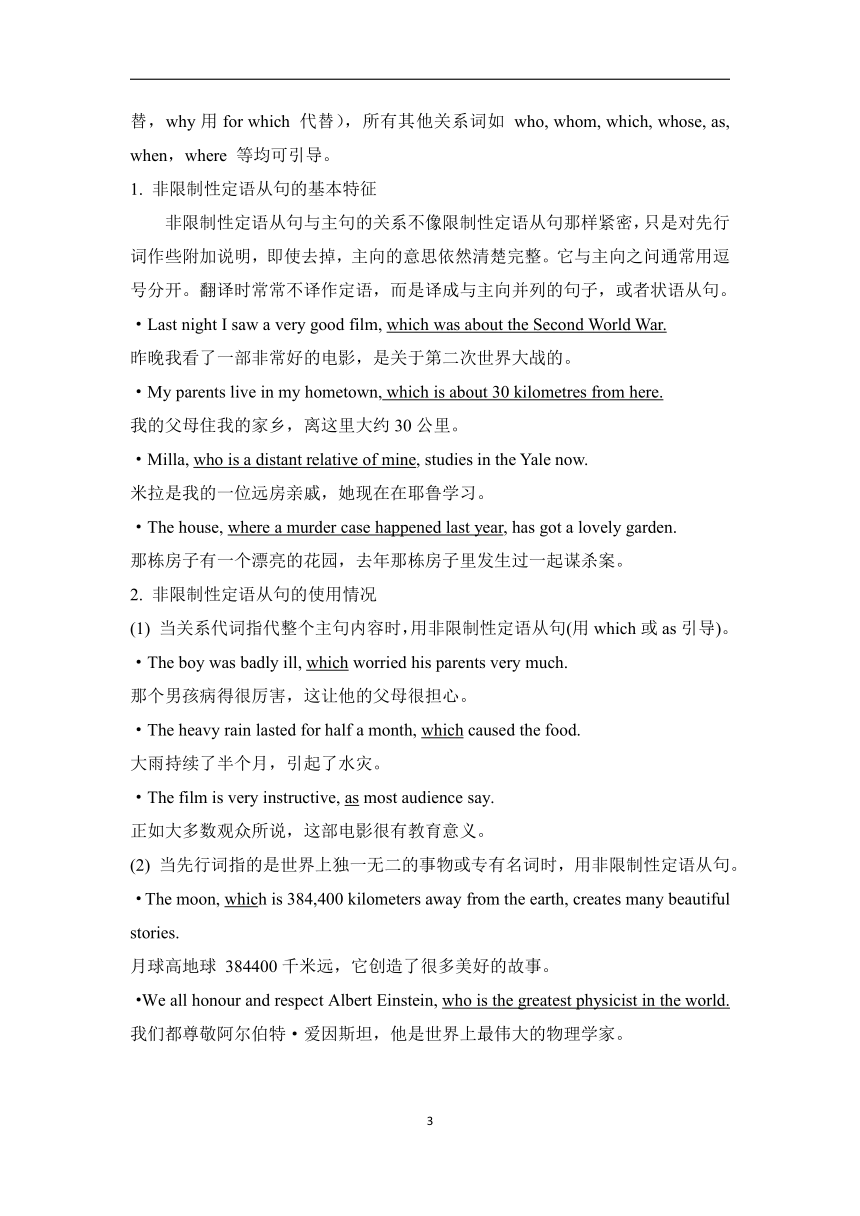外研版(2019)选择性必修 第一册Unit 1 Laugh out loud! Using language 学案(含答案)
文档属性
| 名称 | 外研版(2019)选择性必修 第一册Unit 1 Laugh out loud! Using language 学案(含答案) |

|
|
| 格式 | docx | ||
| 文件大小 | 26.7KB | ||
| 资源类型 | 教案 | ||
| 版本资源 | 外研版(2019) | ||
| 科目 | 英语 | ||
| 更新时间 | 2023-10-24 00:00:00 | ||
图片预览




文档简介
Unit 1 Laugh out loud!
Using language
学习目标
1. 掌握本节生词的表达与运用。
2. 掌握非限制性定语从句的用法。
3. 通过课堂练习,对课文内容有更深入的了解。
知识运用
1. essential
词性:____________ 意思:_____________
essential n. 必需品;必不可少的东西
essentially adv. 本质上,根本上
be essential to/for… 对……极其重要
It is essential that... (should ) do... ……极其重要
an essential part 必不可少的一部分
essential conditions 必要条件
It is essential (for sb.) to do sth (对某人来说)做某事是极其重要的/必不可少的
练习:It will be essential _______ (examine) your body every year.
2. sense
词性:____________ 意思:_____________
make sense of sth. 理解某事,弄懂某事
There's no sense in ( doing )sth. (做)某事没道理。
in a/one sense 从某种意义上说
make no sense 没有道理,没有意义
in no sense 绝不
a sense of humour/direction 幽默感/ 方向感
common sense 常识
练习:_______ a sense, what you said is reasonable.
3. impress
词性:____________ 意思:_____________
impression n.印象
impressive adj. 令人钦佩的,给人深刻印象的
impress sb. with sth. 某事/ 物给某人留下深刻印象
be impressed with/by 对……印象深刻
impress sth. on sb. 使某人了解某事的重要性
impress sth. on one's mind/memory 使某人把……铭记在心
It impresses sb. that 令某人钦佩的是。
leave/make a (n) impression on sb. 给某人留下……印象
first impression 第一印象
an impressive performance 令人难忘的演出
练习:I was impressed _________ his honesty when we met for the first time.
4. deserve
词性:____________ 意思:_____________
deserve to do sth. 值得做某事,应该做某事
deserve all/everything sb. get 罪有应得
deserve consideration/attention 值得考虑/ 注意
学法点拨:
deserve doing = deserve to be done,动名词的主动形式表被动含义,类似的还有:need/want/require doing = need/want/require to be done。
E.g. His eyes need/want/require examining. -His eyes need/want/require to be examined. 他的眼睛需要检查一下。
练习:The doctor deserves _________ (win) the glory.
语法解析
非限制性定语从句
一、非限制性定语从句,顾名思义,就是对先行词没有特别限制的定语从句。除了that和why不能引导之外(在非限制性定语从句中,that用who或which 代替,why用for which 代替),所有其他关系词如 who, whom, which, whose, as, when,where 等均可引导。
1. 非限制性定语从句的基本特征
非限制性定语从句与主句的关系不像限制性定语从句那样紧密,只是对先行词作些附加说明,即使去掉,主向的意思依然清楚完整。它与主向之问通常用逗号分开。翻译时常常不译作定语,而是译成与主向并列的句子,或者状语从句。
·Last night I saw a very good film, which was about the Second World War.
昨晚我看了一部非常好的电影,是关于第二次世界大战的。
·My parents live in my hometown, which is about 30 kilometres from here.
我的父母住我的家乡,离这里大约30公里。
·Milla, who is a distant relative of mine, studies in the Yale now.
米拉是我的一位远房亲戚,她现在在耶鲁学习。
·The house, where a murder case happened last year, has got a lovely garden.
那栋房子有一个漂亮的花园,去年那栋房子里发生过一起谋杀案。
2. 非限制性定语从句的使用情况
(1) 当关系代词指代整个主句内容时,用非限制性定语从句(用which或as引导)。
·The boy was badly ill, which worried his parents very much.
那个男孩病得很厉害,这让他的父母很担心。
·The heavy rain lasted for half a month, which caused the food.
大雨持续了半个月,引起了水灾。
·The film is very instructive, as most audience say.
正如大多数观众所说,这部电影很有教育意义。
(2) 当先行词指的是世界上独一无二的事物或专有名词时,用非限制性定语从句。
·The moon, which is 384,400 kilometers away from the earth, creates many beautiful stories.
月球高地球 384400千米远,它创造了很多美好的故事。
·We all honour and respect Albert Einstein, who is the greatest physicist in the world.我们都尊敬阿尔伯特·爱因斯坦,他是世界上最伟大的物理学家。
(3) 先行词指某人的亲属关系,具有唯一性和确认性时,例如son, daughter, father, mother, wife 等,用非限制性定语从句。
·My father, who is an excellent violinist, is leaving for Canada for performances.
我爸爸是一名出色的小提琴手。他正准备去加拿大演出。
特别提示:
·My elder sister who works in Shanghai sends me an email almost every day.我在上海工作的姐姐几乎每天都给我发电子邮件。(除了在上海工作的姐姐外,可能还有其他姐姐)
·My elder sister, who works in Shanghai, sends me an email almost every day 我姐姐在上海工作,她几乎每天都给我发电子邮件。(只有一个姐姐)
(4) 当引导定语从句的关系代词中,含有some/many/few/a few/little/a little/none/much/most/half of which ( whom )等时,多用非限制性定语从句。
·I know three foreign teachers, two of whom are from Canada.
我认识三名外籍老师,其中两名来自加拿大。
·He earns only 1,200 yuan a month, half of which is given to his son at college.
他一个月仅赚1200元,其中一半给他上大学的儿子。
·There is too much information on the Internet, some of which is unreliable.
因特网上信息太多,其中一些不可靠。
二、 which和as引导的非限制性定语从句,其先行词可以是整个主句或主句的一部分。
关系代词 which 除了指代主句中的某个名词或者整个主句的内容外,还可以代替主向中的名词、形容词或形容词短语,甚至指代部分谓语动词。因为which能够表达比 that和who更加丰富的内容,这是其他关系代词取代不了的。
·She is the perfect accountant, which her predecessor was not.
她是一个完美的会计师,而她的前任不是。(which不单纯指代 accountant,而是指代名词短语the perfect accountant)
·The man was unable to earn enough money, which allowed him to support his family.
那人无法账到足够的钱,足够的钱才能让他养活家人。(which 指代enough money,不是money,更不是整个主句,否则后面的句子就不通了。)
·He was not sick, which some of the other passengers were.
他没有生病,但有些其他旅客却病了。(which 指代形容词 sick)
·She is always careless, which we should not be.
她总是马虎大意,我们可不应该这样。(which指代形容词careless)
·The two policemen were completely trusted, which in fact they were.
那两个警察完全受到信任,事实上,也真是如此。(which指代形容词短语completely trusted)
·She was very patient towards the children, which her husband seldom was.
她对孩子们很耐心,她丈夫却很少这样。(which指代形容词短语very patient towards the children)
·We are still friends, though, which is good. 不过我们仍然是朋友,这令人感到欣慰。(which指代整个主向的内容,在从句中作主语)
2. as引导非限制性定语从句,其先行词是整个主句
as也可以引导非限制性定语从句,先行词就是整个主句,它在定语从句中作主语、宾语。它引导的从句可以位于主句前,也可以位于主句后,还可以位于主句中间。
·The project, as we had expected, got along well.
正如我们所预料的那样,工程进展顺利。(从句在主句中间,as作从句的宾语)
特别提示:
as 引导非限制性定语从句时,常见的固定表达:
as we all know 众所周知
as I can remember 正如我所记得的
as often happens 这经常发生
as we expect 正如我们预料的那样
as you see 如你所见
as has been said before 如前所述
as is well known 众所周知
as was expected 正如预料的那样
as can be seen 看得出来
as may be imagined 正如可以想象出来的那样
as has been said above 如上所述
as we all can see 正如我们都能看到的那样
as is often the case 情况常常如此
as everybody can do 正像人人都能做到的那样
3. as与which引导的非限制性定语从句的区别
关系代词as与which引导的非限制性定语从句,其先行词都可以是整个主句。但as和which具有不同的词义和用法。
(1) as引导的定语从句,表示说话人的看法、态度、解释或评论。
引导定语从句时,as仍具有“正如,像,由……可知”等意思,这些字眼翻译时可 不必译出。as定语从句中常含有这些动词:see, know, hear, watch, remember, say, tell, show, expect, guess等。这类动词与as连用几乎成了一种固定搭配。as引导的定语从句可以置于句首、句中或向尾。
·Respecting the old and taking care of the young, as we all know, is a good Chinese tradition.
众所周知,尊老爱幼是中国人的优良传统。
·There is a net bar around here, as I remember.
我记得这儿附近有一家网吧。
·As is often the case, girls like dolls while boys like guns.
女孩子喜欢玩偶而男孩子喜欢枪,这是常见的情况。
(2) which引导的从句对主句所叙述的事情进行补充说明表明事物的状态或结果。
which此时指前面主句所提到的这件事,常译为“这一点,这件事”等。这时它所引导的从句与主句之间常表示并列意义或状语意义。注意它引导的从句不像as那样位置灵活,它只能位于主句的后面。
·He changed his mind again, which (= and it) made us all angry.
他又改变了主意,这使我们大家都生气了。
·She tore up my photos, which (= and it) upset me.
她撕碎了我的照片,这使我很生气。
(3)在从句中作定语或介词的宾语时,要用 which。
·Jenny might come, in which case I'll ask her.
詹妮可能会来,要是那样的话我就去问她。
·She graduated from a local middle school, after which she went to Beijing University.
她毕业于当地的一所中学,之后她去了北京大学。
(4)当从句的谓语是否定形式或含着一个复合宾语时,一般用which而不用as。
He pretended not to know me, which I didn't understand.
他假装不认识我,这是我搞不明白的。
He admires everyone in his class, which I find quite strange.
他羡慕班里的每个学生,我认为这太奇怪了。
练习:
1. After watching their performance, people _______ are in a bad mood will cheer up.
2. Students should involve themselves in community activities _______they can gain experience for growth.
3. I am looking forward to the day _______my daughter can read this book and know my feelings for her.
4. _______ is often the case with children, Amy was better by the time the doctor arrived.
5. John invited about 40 people to his wedding, most of _______ are family members.
6. The growing speed of a plant is influenced by a number of factors, most of _______ are beyond our control.
答案
知识运用
1. to examine 2. In 3. with/by 4. to win
语法解析
1. who 2. where 3. when 4. As 5. whom 6. which
2
Using language
学习目标
1. 掌握本节生词的表达与运用。
2. 掌握非限制性定语从句的用法。
3. 通过课堂练习,对课文内容有更深入的了解。
知识运用
1. essential
词性:____________ 意思:_____________
essential n. 必需品;必不可少的东西
essentially adv. 本质上,根本上
be essential to/for… 对……极其重要
It is essential that... (should ) do... ……极其重要
an essential part 必不可少的一部分
essential conditions 必要条件
It is essential (for sb.) to do sth (对某人来说)做某事是极其重要的/必不可少的
练习:It will be essential _______ (examine) your body every year.
2. sense
词性:____________ 意思:_____________
make sense of sth. 理解某事,弄懂某事
There's no sense in ( doing )sth. (做)某事没道理。
in a/one sense 从某种意义上说
make no sense 没有道理,没有意义
in no sense 绝不
a sense of humour/direction 幽默感/ 方向感
common sense 常识
练习:_______ a sense, what you said is reasonable.
3. impress
词性:____________ 意思:_____________
impression n.印象
impressive adj. 令人钦佩的,给人深刻印象的
impress sb. with sth. 某事/ 物给某人留下深刻印象
be impressed with/by 对……印象深刻
impress sth. on sb. 使某人了解某事的重要性
impress sth. on one's mind/memory 使某人把……铭记在心
It impresses sb. that 令某人钦佩的是。
leave/make a (n) impression on sb. 给某人留下……印象
first impression 第一印象
an impressive performance 令人难忘的演出
练习:I was impressed _________ his honesty when we met for the first time.
4. deserve
词性:____________ 意思:_____________
deserve to do sth. 值得做某事,应该做某事
deserve all/everything sb. get 罪有应得
deserve consideration/attention 值得考虑/ 注意
学法点拨:
deserve doing = deserve to be done,动名词的主动形式表被动含义,类似的还有:need/want/require doing = need/want/require to be done。
E.g. His eyes need/want/require examining. -His eyes need/want/require to be examined. 他的眼睛需要检查一下。
练习:The doctor deserves _________ (win) the glory.
语法解析
非限制性定语从句
一、非限制性定语从句,顾名思义,就是对先行词没有特别限制的定语从句。除了that和why不能引导之外(在非限制性定语从句中,that用who或which 代替,why用for which 代替),所有其他关系词如 who, whom, which, whose, as, when,where 等均可引导。
1. 非限制性定语从句的基本特征
非限制性定语从句与主句的关系不像限制性定语从句那样紧密,只是对先行词作些附加说明,即使去掉,主向的意思依然清楚完整。它与主向之问通常用逗号分开。翻译时常常不译作定语,而是译成与主向并列的句子,或者状语从句。
·Last night I saw a very good film, which was about the Second World War.
昨晚我看了一部非常好的电影,是关于第二次世界大战的。
·My parents live in my hometown, which is about 30 kilometres from here.
我的父母住我的家乡,离这里大约30公里。
·Milla, who is a distant relative of mine, studies in the Yale now.
米拉是我的一位远房亲戚,她现在在耶鲁学习。
·The house, where a murder case happened last year, has got a lovely garden.
那栋房子有一个漂亮的花园,去年那栋房子里发生过一起谋杀案。
2. 非限制性定语从句的使用情况
(1) 当关系代词指代整个主句内容时,用非限制性定语从句(用which或as引导)。
·The boy was badly ill, which worried his parents very much.
那个男孩病得很厉害,这让他的父母很担心。
·The heavy rain lasted for half a month, which caused the food.
大雨持续了半个月,引起了水灾。
·The film is very instructive, as most audience say.
正如大多数观众所说,这部电影很有教育意义。
(2) 当先行词指的是世界上独一无二的事物或专有名词时,用非限制性定语从句。
·The moon, which is 384,400 kilometers away from the earth, creates many beautiful stories.
月球高地球 384400千米远,它创造了很多美好的故事。
·We all honour and respect Albert Einstein, who is the greatest physicist in the world.我们都尊敬阿尔伯特·爱因斯坦,他是世界上最伟大的物理学家。
(3) 先行词指某人的亲属关系,具有唯一性和确认性时,例如son, daughter, father, mother, wife 等,用非限制性定语从句。
·My father, who is an excellent violinist, is leaving for Canada for performances.
我爸爸是一名出色的小提琴手。他正准备去加拿大演出。
特别提示:
·My elder sister who works in Shanghai sends me an email almost every day.我在上海工作的姐姐几乎每天都给我发电子邮件。(除了在上海工作的姐姐外,可能还有其他姐姐)
·My elder sister, who works in Shanghai, sends me an email almost every day 我姐姐在上海工作,她几乎每天都给我发电子邮件。(只有一个姐姐)
(4) 当引导定语从句的关系代词中,含有some/many/few/a few/little/a little/none/much/most/half of which ( whom )等时,多用非限制性定语从句。
·I know three foreign teachers, two of whom are from Canada.
我认识三名外籍老师,其中两名来自加拿大。
·He earns only 1,200 yuan a month, half of which is given to his son at college.
他一个月仅赚1200元,其中一半给他上大学的儿子。
·There is too much information on the Internet, some of which is unreliable.
因特网上信息太多,其中一些不可靠。
二、 which和as引导的非限制性定语从句,其先行词可以是整个主句或主句的一部分。
关系代词 which 除了指代主句中的某个名词或者整个主句的内容外,还可以代替主向中的名词、形容词或形容词短语,甚至指代部分谓语动词。因为which能够表达比 that和who更加丰富的内容,这是其他关系代词取代不了的。
·She is the perfect accountant, which her predecessor was not.
她是一个完美的会计师,而她的前任不是。(which不单纯指代 accountant,而是指代名词短语the perfect accountant)
·The man was unable to earn enough money, which allowed him to support his family.
那人无法账到足够的钱,足够的钱才能让他养活家人。(which 指代enough money,不是money,更不是整个主句,否则后面的句子就不通了。)
·He was not sick, which some of the other passengers were.
他没有生病,但有些其他旅客却病了。(which 指代形容词 sick)
·She is always careless, which we should not be.
她总是马虎大意,我们可不应该这样。(which指代形容词careless)
·The two policemen were completely trusted, which in fact they were.
那两个警察完全受到信任,事实上,也真是如此。(which指代形容词短语completely trusted)
·She was very patient towards the children, which her husband seldom was.
她对孩子们很耐心,她丈夫却很少这样。(which指代形容词短语very patient towards the children)
·We are still friends, though, which is good. 不过我们仍然是朋友,这令人感到欣慰。(which指代整个主向的内容,在从句中作主语)
2. as引导非限制性定语从句,其先行词是整个主句
as也可以引导非限制性定语从句,先行词就是整个主句,它在定语从句中作主语、宾语。它引导的从句可以位于主句前,也可以位于主句后,还可以位于主句中间。
·The project, as we had expected, got along well.
正如我们所预料的那样,工程进展顺利。(从句在主句中间,as作从句的宾语)
特别提示:
as 引导非限制性定语从句时,常见的固定表达:
as we all know 众所周知
as I can remember 正如我所记得的
as often happens 这经常发生
as we expect 正如我们预料的那样
as you see 如你所见
as has been said before 如前所述
as is well known 众所周知
as was expected 正如预料的那样
as can be seen 看得出来
as may be imagined 正如可以想象出来的那样
as has been said above 如上所述
as we all can see 正如我们都能看到的那样
as is often the case 情况常常如此
as everybody can do 正像人人都能做到的那样
3. as与which引导的非限制性定语从句的区别
关系代词as与which引导的非限制性定语从句,其先行词都可以是整个主句。但as和which具有不同的词义和用法。
(1) as引导的定语从句,表示说话人的看法、态度、解释或评论。
引导定语从句时,as仍具有“正如,像,由……可知”等意思,这些字眼翻译时可 不必译出。as定语从句中常含有这些动词:see, know, hear, watch, remember, say, tell, show, expect, guess等。这类动词与as连用几乎成了一种固定搭配。as引导的定语从句可以置于句首、句中或向尾。
·Respecting the old and taking care of the young, as we all know, is a good Chinese tradition.
众所周知,尊老爱幼是中国人的优良传统。
·There is a net bar around here, as I remember.
我记得这儿附近有一家网吧。
·As is often the case, girls like dolls while boys like guns.
女孩子喜欢玩偶而男孩子喜欢枪,这是常见的情况。
(2) which引导的从句对主句所叙述的事情进行补充说明表明事物的状态或结果。
which此时指前面主句所提到的这件事,常译为“这一点,这件事”等。这时它所引导的从句与主句之间常表示并列意义或状语意义。注意它引导的从句不像as那样位置灵活,它只能位于主句的后面。
·He changed his mind again, which (= and it) made us all angry.
他又改变了主意,这使我们大家都生气了。
·She tore up my photos, which (= and it) upset me.
她撕碎了我的照片,这使我很生气。
(3)在从句中作定语或介词的宾语时,要用 which。
·Jenny might come, in which case I'll ask her.
詹妮可能会来,要是那样的话我就去问她。
·She graduated from a local middle school, after which she went to Beijing University.
她毕业于当地的一所中学,之后她去了北京大学。
(4)当从句的谓语是否定形式或含着一个复合宾语时,一般用which而不用as。
He pretended not to know me, which I didn't understand.
他假装不认识我,这是我搞不明白的。
He admires everyone in his class, which I find quite strange.
他羡慕班里的每个学生,我认为这太奇怪了。
练习:
1. After watching their performance, people _______ are in a bad mood will cheer up.
2. Students should involve themselves in community activities _______they can gain experience for growth.
3. I am looking forward to the day _______my daughter can read this book and know my feelings for her.
4. _______ is often the case with children, Amy was better by the time the doctor arrived.
5. John invited about 40 people to his wedding, most of _______ are family members.
6. The growing speed of a plant is influenced by a number of factors, most of _______ are beyond our control.
答案
知识运用
1. to examine 2. In 3. with/by 4. to win
语法解析
1. who 2. where 3. when 4. As 5. whom 6. which
2
